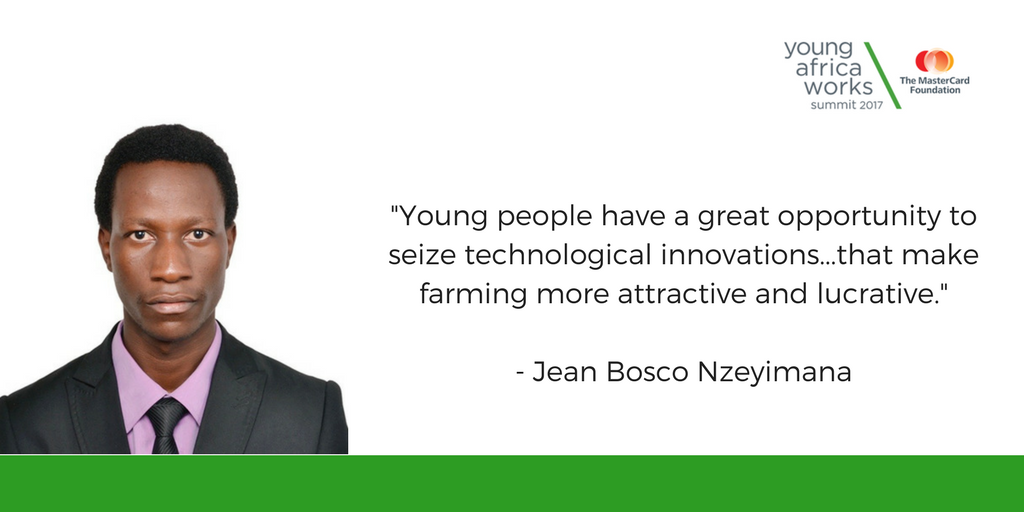
Creating a Sustainable Replacement to Wood and Charcoal
I was born in a small village in southern Rwanda, where the majority of inhabitants rely on subsistence farming for their daily living. Given its far distance from the national grid, the village has no access to electricity, and biomass is the main source of fuel. As I grew up facing these challenges firsthand, I developed a passion for having a direct role in improving my livelihood and the livelihoods of my fellow villagers.
I started a company called Habona Ltd. that collects organic waste and turns it into products like briquettes, biogas, and organic fertilizers. Our briquettes are a sustainable replacement to the wood charcoal that people have been using for many years, which in turn helps to combat deforestation, and the indoor pollution caused by smoke emitted while burning wood as a cooking fuel.
The byproduct of the briquette and biogas production process is fresh fermented organic fertilizer that can be used in place of chemical fertilizers to help boost agricultural yields. This is critical given that farmlands in the area have lost their natural fertility as a result of high exploitation.
Farmers know that the use of inorganic fertilizers is one of the causes of soil degradation, but it has been a challenge to find alternative green solutions that will help restore the immunity of the soil. This is where Habona Ltd. intervenes by providing organic fertilizer made from waste collected in different neighborhoods and communities. This is not only a solution for farming, but also a climate change mitigation and adaptation measure because we are reducing the greenhouse gas that would otherwise be emitted by that waste if it was not collected from the streets and poor landfill sites.
Enabling access to organic fertilizer is one way that Habona is encouraging climate-smart agricultural techniques. Unlike traditional farming methods, climate-smart agriculture is an approach for developing agricultural strategies to secure sustainable food security in a changing climate. Under this model, farmers are taught to adapt to climate change hazards like unpredictable weather, flooding, and erosion, and to continue the food production cycle regardless of weather, traditionally categorized into farming seasons.
To that end, we have started a climate-smart model farm where we showcase the benefits of climate-smart agriculture and teach farmers to replicate the same model on their own farms.
I hope that Habona will show other young people the potential of working in the agricultural sector. Farming has had lower levels of success mainly because of low participation rates of young people.
Most young graduates prefer white collar jobs instead of venturing into farming. It has been a huge subject of debate as to whether young people are averse to potential risks associated with farming, or whether farming as a profession has failed to brand itself as not only a lucrative business, but also an important industry that is a major stimulus for life. We need to ensure that young people see the potential and are attracted to the agricultural sector.
Young people must recognize the opportunities that farming offers; the first being job creation. Farming has the potential for reducing unemployment among youths. Another opportunity is addressing skills gaps. The older generation has failed to keep pace with changing technology. Young people have a great opportunity to seize technological innovations like meteorology systems that help in weather prediction, mobile applications that may link farmers to markets, and other innovations that make farming more attractive and lucrative. Young people are aware of these tools, and can potentially apply them to overcome challenges in farming.
Forums like the Young Africa Works Summit are very important in terms of bringing together young people who are involved in farming to discuss issues surrounding them. This platform also helps young farmers to showcase their innovation and to network with policymakers and stakeholders involved in the farming value chain.
I hope to make it a platform for building a community of like-minded people, so we can eventually create a network where we can share ideas and exchange best practices.
During the 2016 Rwanda National Dialogue Day, an old man stood and solemnly affirmed that “No farmer, no food, no future”. I believe that young people must have the same mentality and take the lead in securing our future through farming.
Jean Bosco Nzeyimana is the founder and CEO of Habona Ltd., a company that produces affordable and environmentally friendly biofuels from waste. He is a youth delegate and speaker at the Summit. Follow the conversation on Twitter using #YAW2017.


